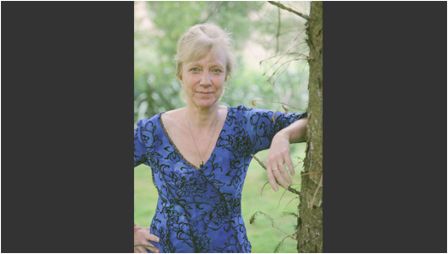Art in the Right Place
With Mandy Hagar
.jpg)
"Dear Vincent" is novel about painting, suicide and Vincent Van Gogh. Published by Random House NZ in June 2013.

1. Most writers who return from the Menton Fellowship wax lyrical about their time spent in the Katherine Mansfield room at Villa Isola Bella in Menton. Was your experience in Menton a rapturous one?
It was the most extraordinary time, so much so it’s hard to quantify in words. Because I was researching rather than writing, and our apartment was quiet and had amazing views over the sea, I also worked a lot from ‘home’, as I had access to the internet there. My most favourite afternoon in the Katherine Mansfield room was when a big group of students came to visit from Tawa and St Patrick’s colleges (on a French language trip). We all crammed into the room to see if everyone could fit – a bit like seeing how many people can fit into a phone box! It was VERY tight but a great ice-breaker, and then we all trooped out and sat in the garden in front, soaking up the sun as we talked about writing and Katherine Mansfield’s life and work. Nothing makes me happier than speaking with interested young people and I really loved being able to share a little of Villa Isola Bella’s magic with them.
2. In Menton you were writing out of your normal context, in a foreign country on the other side of the world. Was this inspiring or unsettling? Did this change your writing process or style in any way?
As I was researching, the majority of the writing I did there (apart from producing several books full of notes!) was to record some of my experiences as a blog on my website www.mandyhager.com . I tried to write about the things that challenged me or amazed me – the kind of strange juxtapositions that take a writer’s eye, like the used sanitary pad lying on the stairway as we walked into the Vatican! And also to use it as a bit of a record for myself. I know from experience that everything I saw and did there will be resurrected at some stage in future writing.
I think what happens when anyone spends time away from home for an extended period is that it gives you the chance to look at your own country from the outside and compare it to what’s around you. What I love about the Fellowship is that the Trustees absolutely understand this – that, actually, everything you do there, from active research and writing, to sitting in a café and watching the people around you, is all fabulous fodder for writers. So, in answer to your question, it was both inspiring and unsettling! Inspiring, because it has fed my imagination in so many ways; unsettling because of what I observed – both in Europe and looking back at New Zealand.
There are several very clear experiences and discoveries that will stay with me and continue to infuse my thinking and writing from here on in. One is around the issues of how to deal with the tidal wave of people displaced by wars, poverty and climate change, as it now starts to hit. Racism would seem to be part of a bigger political picture playing out in France (and the rest of Europe), as unemployment reaches terrifying levels and many countries buckling under the strain. And all this plays out against the at-times obscene display of wealth along the beautiful Côte d’Azur, including Monaco (a city-state temple to capitalism). The gap between the rich and poor, and the excessive privilege of the 1%, exists there as a perfect microcosm of this global problem.
Yet there is much in France that we could learn from, and which makes New Zealand pale in comparison. In the course of my research trip around France, we were struck by the beauty of the landscape and the far more sustainable farming practices. There is also a much greater sense of family as important – time made to dine together, play together. There is a totally free health system, covering doctor visits and other free social services that we in New Zealand now can only mourn the loss of. Prices of food are regulated. True, they have taxes for everything, but it means that everyone gets to benefit. Socialism has yet to become a totally dirty word there.
3. Eleanor Catton has recently announced a generous grant to enable writers to have time to read. Do you think grants and fellowships are a luxury or a necessity for a writer?
First, I’d like to say how much I admire Eleanor’s generosity in this – and also her statements at the time of the election around paying more tax in order to support others. Very impressive. Grants and fellowships are imperative to writers (and all other creative workers). It’s incredibly difficult to maintain oneself as a writer and still have time and energy enough to produce anything substantial. And the learning of the craft takes years (well, for slow learners like me anyway!), so most of us resign ourselves to always living hand to mouth, or else relying on the goodwill of partners or family for support. To have a decent period of time when the daily money problems can be put aside so concentrated time and space can be given to working is hugely helpful – a priceless gift. Definitively a necessity in an ideal world.
4. Did you go to Menton with a project in mind and how has this project been influenced by your time there?
I did indeed and the project has been hugely influenced by my time there. The (true) story is set in twelfth-century France, so to be able to go to the places relevant to the story and walk through them, drinking in as much as possible, was incredibly helpful. While I had already studied much of this online, there is nothing like physically exploring a building or a landscape to discover its scale, feel, smells, sounds etc. Also, to have unobstructed time to sink myself into the stack of source books I had taken over with me and dig around academic papers and texts, means that I have really come to understand the story and to discover fascinating material that has not been touched on in fiction before and which will hugely enhance the telling. It’s really very exciting!
5. What was the most surprising discovery you made while on the Menton Fellowship?
I guess it was probably about myself and my ability to cope (mostly!) when pushed right outside my comfort zone. I’m not much of a risk-taker, a bit of a homebody and ridiculously shy, but I made a deal with myself that I’d put my hand up for every opportunity and give it a good shot. As a result I’ve had the most amazing experiences, from sitting on a panel at a literary festival with Fay Weldon and running a writing workshop in Paris, to swimming in the sea at night by the light of a super moon, climbing right to the top of Chartres Cathedral and communing with sperm whales off the coast of Italy! For all these experiences, and more, I will be forever grateful to the Katherine Mansfield Fellowship Trust for giving me the opportunity.
Mandy Hager is a fiction writer. Her published writing includes novels for young adults and adults, non-fiction resources for youth, scripts and short stories and she was the recipient of the Katherine Mansfield Menton Fellowship for 2014. Among the many awards for her writing, Mandy’s first book, Tom’s Story (1995), won an Honour Award in the 1996 Aim Children’s Book Awards and Dear Vincent won the 2014 LIANZA Young Adult Award. Her latest novel is Singing Home the Whale (Random House NZ, 2014). For more information on Mandy Hager, visit her Book CouncilWriters file.

